Rize
 for suggestive content, drug references, language and brief nudity.
for suggestive content, drug references, language and brief nudity.
Reviewed by: Richard F. Schmitz
CONTRIBUTOR
| Moral Rating: | Average |
| Moviemaking Quality: |
|
| Primary Audience: | Teens Adults |
| Genre: | Documentary |
| Length: | 1 hr. 24 min. |
| Year of Release: | 2005 |
| USA Release: |
June 24, 2005 (LA/NY) |
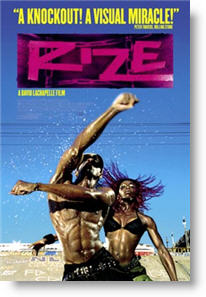
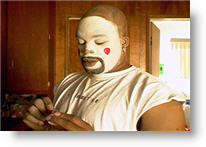
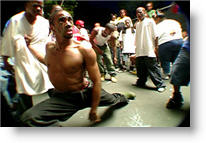
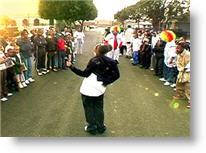
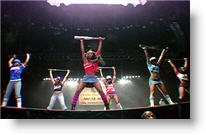
| Featuring |
|---|
| Tommy the Clown, Lil Tommy, Larry, Lil C, Tight Eyez |
| Director |
|
David LaChapelle |
| Producer |
| Rebecca Skinner, David LaChapelle, Marc Hawker |
| Distributor |
 Lionsgate (Lions Gate Entertainment Corp.) |
There is a small scene in photographer David LaChapelle’s documentary film RIZE that reveals just how far most of us are from really understanding the day to day lives of people in the gang-ridden neighborhoods of South L.A., Watts or Compton. At a grim strip mall, there’s a shop selling discount caskets. The owner is a cheerful, older man, who smiles when he sees a group of teenagers walking by. He hands out his cards. “Give these to your parents,” he says, explaining to the camera that it’s young people who do a lot of the dying in his neighborhood.
Like many of his contemporaries, Tommy Johnson dealt drugs and went to jail. After he got out, two things happened: he became committed to his small, storefront church, and the Rodney King riots tore up his neighborhood. Deciding he could at least make a little difference, he became Tommy The Clown—the first hip hop birthday clown. Tommy the Clown would step out of his little VW beetle, rainbow fright wig and clown paint in place, and put a boom box on the sidewalk, then entertain children’s birthday parties with his unique style of hip hop dancing, which he called clowning.
Soon, Tommy the Clown opened a clown school—basically a place where youngsters could hang out and learn face painting and Tommy’s unique hip hop style. The documentary film explains the quick evolution of clowning to krumping—a vigorous style of dance, hip hop mixed with break dancing and simulated fighting. It’s strictly free-lance at first—dance competitions were held on street corners, in alley ways, in basements and on basketball courts.
There was simulated fighting, but no real fighting. And that was Tommy’s point. He recognized the draw of gangs, and he determined that clowning could be an alternative—where love, not hate, motivated the competition. There’s a moving scene where one of the main characters explains “we’re human beings. We’re worth more than sneakers or gold chains or an SUV.”
RIZE mixes amazing scenes of street corner dancing where the movements are so fast and so energetic the film begins with the explanation: “no scenes in this film are sped up.” Eventually, clowns and krumps meet at a city-wide dance contest at a sports arena before a huge crowd. By the time this competition is filmed, there are dozens of clown schools, all sprouting from Tommy’s original vision. There’s anger over the outcome, but no violence.
RIZE is unapologetic about the importance of Christian faith to its subjects, and a number of these main characters offer sincere testimonies as to their faith. Christian faith is portrayed as the bedrock of these dancers commitment to offer something better.
There are moments in this film that will disturb many Christians. One form of dancing is called stripper dancing. The style is obviously based on strip club performances and in RIZE it’s performed in one short scene by preteen girls. This is explained, however. In a rap and gang culture that is overwhelmingly misogynistic, clowning and krumping is not. Girls and boys stand and perform equally. Stripper dancing, the narrator explains, is just dancing. There is no sexual intent and none should be taken.
The film shows a teenage boy explain, matter-of-factly, that his family is violently conflicted because the father is in one gang, his son in another. That said, I was willing to take the stripper dancing explanation at its word.
There is a rap and hip-hop film score (amazingly very little bad language is used). RIZE is simply filmed and sincere in its presentation. In one scene a group of teens are clowning on a neighborhood street. The film pans to an older, white couple standing in their yard. The cliché would have the older folks summon the police. Instead we see big smiles and waves of support—from both groups.
RIZE is a positive, entertaining and uplifting film. It’s a raw and honest look at life in one of the most troubled neighborhoods anywhere in urban America. RIZE won’t be for everyone, and some Christians will be justifiably troubled by some scenes in this documnentary film. Teens live in a popular culture that preaches death—abortion, material over spiritual, etc. With that in mind, RIZE is a cultural breath of fresh air for teens.There’s surprisingly little bad language. RIZE should serve as a good opportunity to hold a conversation about the power of Christ’s love to change lives as well as contemporary social issues.
See list of Relevant Issues—questions-and-answers.


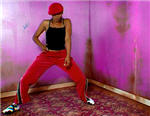




My Ratings: Better than Average / 5